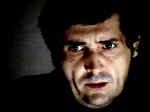I began today's homily by describing Steven Carter's 1994 Pulitzer Prize winning photo. Few images have engraved themselves as permanently in my memory. I was sure lots of the folks at church would remember it too. Some didn't know, however, that Carter took his own life a few months after receiving the prestigious award for his photo.
 A Sudanese child slowly making her way to a UN relief camp at the height of the famine. The girl, skin and bones, is being stalked by a vulture, patiently pursuing its next meal. No one knows what became of the child. The picture would suggest that her fate was not a dignified one...
A Sudanese child slowly making her way to a UN relief camp at the height of the famine. The girl, skin and bones, is being stalked by a vulture, patiently pursuing its next meal. No one knows what became of the child. The picture would suggest that her fate was not a dignified one...My one fleeting experience with hunger - medically induced at that - was in Guerrero, Mexico about an hour south of Chilpancingo. I was on missions among indigenous communities during the summer and the water was bad. I got typhoid and was VERY sick. Wasn't allowed to eat anything for nearly a week and by the time it was over I could have bitten the arm of the nurse that was looking after me.
I consider that experience an 'artificial hunger' because there was food available, I just couldn't eat it. Nonetheless, it was enough of a hint to help me imagine what millions of people around the world suffer daily, with no permanent relief in sight.
That piercing, obsessive, all-consuming need to eat, to drink, to satisfy the most basic premise of human existence...
It's hard for us to even envision. We throw away more food in one day than lots of folks eat in a week. Yet the human experience of hunger and the capacity of bread to satisfy it serve our Lord as a point of departure in his 'bread of life' discourse which the Sunday liturgy has been doling out to us recently.
"You seek me out not because you have seen the signs, but because you ate the loaves and had your hunger satisfied."
All Christ's words are self-revelatory. His parables, his preaching, his admonitions are meant to tell us who he really is. He speaks of hunger, thirst, bread and drink so that, by analogy, we may see what he conceives his relationship with us to be. He fully considers himself the fundamental condition and source of life itself. What physical hunger and thirst can turn into for people - overwhelming, burning need - is but a premonition of what Christ esteems our relation to him to be.
 All human need, therefore, in Christ's mind is a reflection of man's true origin and nature. The need for rest when we are tired, the need for medicine when we are sick, the need for friendship when we are lonely, the need for freedom when we are constrained, the need for food and drink when we are hungry and thirsty... all our deepest needs have their origin and their raison d'etre in our radical dependence on the source of our being.
All human need, therefore, in Christ's mind is a reflection of man's true origin and nature. The need for rest when we are tired, the need for medicine when we are sick, the need for friendship when we are lonely, the need for freedom when we are constrained, the need for food and drink when we are hungry and thirsty... all our deepest needs have their origin and their raison d'etre in our radical dependence on the source of our being.From there to sacramental theology is but a small step.
And that brings us to next week's homily...

